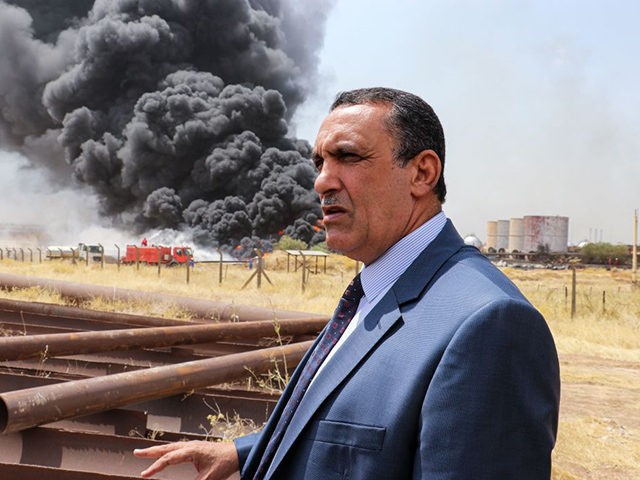Iraq announced a travel ban on the governor of Kirkuk, Rakan al-Jabouri — appointed to restore Baghdad-led leadership and expel Kurdish leadership in the aftermath of the 2017 Kurdish independence referendum — on Tuesday amid charges of criminally misappropriating public funds.
Kirkuk is a multi-ethnic city in northern Iraq traditionally under the governance of Baghdad, coveted for its extensive oil reserves. In 2014, the Islamic State attacked the city and the Iraqi military fled. Peshmerga troops affiliated with the autonomous Kurdistan Regional Government (KRG) based in Erbil filled the void, expelling ISIS from the city and taking over its administration.
Following the demise of the Islamic State in the country — largely at the hand of U.S.-allied Peshmerga forces — then-Kurdish President Masoud Barzani called for a referendum on Kurdish independence, which the Kurds approved in a landslide vote in September 2017. Baghdad responded to the vote, which the KRG emphasized was neither a declaration of secession or a binding referendum, the Iraqi military demanded restored control of Kirkuk and wrested it from Kurdish control with the help of Iran-backed militias known as the Popular Mobilization Forces (PMF).
The siege of Kirkuk resulted in over 100,000 civilians fleeing and, Kurds say, an ongoing ethnic cleansing campaign encouraging both Sunni and Shiite Arabs to take over communities belonging to Kurds, Turkmen, and other minorities.
Baghdad officials appointed al-Jabouri governor of Kirkuk without a vote in late 2017. Al-Jabouri now faces charges of “wasting public money,” according to the Kurdish outlet Rudaw. The Iraqi Board of Integrity, which oversees ethics complaints against public officials, announced on Tuesday that al-Jabouri could not legally leave Iraq. He stands accused of involvement in the disappearance of part of a budget of 57 billion Iraqi dinar ($48 million) meant for the construction of 25 schools is Kirkuk governate.
According to the court imposing the travel ban, an investigation revealed that the private contractor that al-Jabouri’s administration hired to build the 25 schools “had tampered with the basic designs and reduced the number of schools from 25 to 18 and changed designs and spaces, contrary to the terms of contracts and without obtaining the approval of the Ministry of Planning.” Officials allegedly pocketed the money for the missing seven schools.
Al-Jabouri is among 23 others working in the Kirkuk government banned from leaving the country and facing criminal charges.
Kurdish officials remaining in Kirkuk first revealed that a court would issue an arrest warrant for al-Jabouri in December 2018 for alleged corruption involving unspecified construction projects planned in the city.
“Ahmed Askari, a member of the Kirkuk Provincial Council, recently told local media that there is excessive corruption in Kirkuk projects where money is being spent without the supervision or knowledge of the Council,” the Kurdistan 24 news network reported at the time.
Kurdish leaders described the events leading to al-Jabouri’s tenure at the head of Kirkuk’s government as extremely violent and concerning, particularly the role the PMF played in helping the Iraqi government take over the city. The PMF are a coalition that include openly jihadist organizations and Iranian affiliates such as the Hezbollah Brigades. Iraq legalized them all as one formal wing of the Iraqi military in March 2018. The PMF played a prominent role against ISIS given the poor quality of the Iraqi military, garnering praise from the Pentagon.
Outgoing Peshmerga forces testified to witnessing Shiite PMF fighters assault and kill U.S.-allied Peshmerga soldiers. A Rudaw journalist said in October 2017 that he personally saw the beheaded bodies of ten Peshmerga soldiers, victims of the PMF, as well as mass looting and burning of neighborhoods — as many as 150 homes — known to be populated by Kurdish people.
By October 2017, Kurdish officials said they were aware of 100,000 people fleeing Kirkuk to avoid falling under control of the PMF. Peshmerga fighters testified to the presence of members of the Iranian Islamic Revolutionary Guard Corps (IRGC), a U.S.-designated terrorist organization, in Kirkuk — particularly its feared Quds Force foreign terrorism brigade. Some reports claimed that the head of the Quds Force at the time, Major General Qasem Soleimani, was in Iraq at the time to coordinate PMF attacks.
President Donald Trump ordered a fatal airstrike against Soleimani and Abu Mahdi al-Muhandis, the head of the Hezbollah Brigades, in January. Both were in Iraq at the time of their demise.
At the time of the invasion of Kirkuk, however, the U.S. State Department did not corroborate reports of Soleimani or his forces working with the PMF there.
“I’m not aware of any Iranian involvement in that, per se,” then-State Department spokeswoman Heather Nauert told reporters in October 2017. Trump personally insisted that the United States would not “take sides” between the U.S.-allied Kurds and the Iran-backed PMF.
Among al-Jabouri’s first prominent public acts was to hold a press conference alongside Kirkuk leaders in which the new administrators repeatedly scolded the Kurdish police chief of the governate, Omar Khatab, for speaking Kurdish. Kurds have accused al-Jabouri and Baghdad generally of attempting to resettle Arabs from other parts of Iraq in the parts of Kirkuk where the over 100,000 Kurds, Turkmen, and other ethnic minorities once lived. In addition to failing to build the schools promised and leading efforts to change the demographics of the region, Kirkuk locals have protested for years that they lack sustained access to basic government services like clean water.

COMMENTS
Please let us know if you're having issues with commenting.